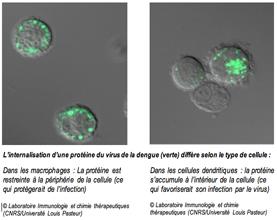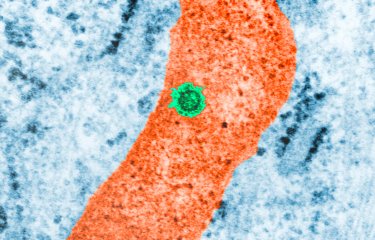It is becoming increasingly common to see individuals infected by the dengue virus who develop an ultimately fatal hemorrhagic syndrome, particularly in children during epidemics. However, in most cases, dengue remains a generally benign or even asymptomatic viral infection. One explanation for this phenomenon has just been put forward by researchers from CNRS , Institut Pasteur , Inserm and the University of Berkeley (California, USA) in a recent publication in the journal PloS NTD. The demonstration of a new mechanism of resistance to dengue virus could form the basis for new strategies to prevent this disease.
Press release
Paris, october 14, 2008

The scientists observed that human dermal macrophages expressing CD209/DC-SIGN were able to capture the dengue virus inoculated by the mosquito without the virus being able to multiply. This unexpected inhibition of viral replication, despite the virus being present in the macrophage, has recently been demonstrated by a group of researchers from CNRS, Institut Pasteur, Inserm and the University of Berkeley who were collaborating on this project on dengue. Their report constitutes the first description of a new resistance mechanism that represents an important innate defence system against dengue virus infection in humans.
Each year, dengue affects more than 100 million people out of the two billion who live in regions infested by the vector mosquito Aedes aegypti. This disease constitutes a growing public health problem linked to the extension of infested zones and the increase in the number of severe cases in regions with high endemicity. It has become the principal emerging vector-borne viral disease in tropical and subtropical regions of South-East Asia and Latin America, including French overseas departments and territories such as the French West Indies and Guiana, and French Polynesia. In mainland France, dengue has been a notifiable disease since 2006.
________
1 Laboratoire Immunologie et chimie thérapeutiques (CNRS/Université Louis Pasteur)
2 Unité Interaction Moléculaires Flavivirus-Hôtes (Institut Pasteur), Unité de recherche de virologie structurale (Institut Pasteur/CNRS),
3 Inserm U872
4 Immune response cells involved in controlling infection by pathogenic agents
Source
Dermal-Type Macrophages Expressing CD209/DC-SIGN Show Inherent Resistance to Dengue Virus Growth, PLoS Neglected Tropical Diseases, published online October 1st , 2008.
Wing-Hong Kwan1,2,3, Erika Navarro-Sanchez 4,5, Hélène Dumortier 1, Marion Decossas 1, Hortense Vachon 1, Flavia Barreto dos Santos 6, Hervé W. Fridman 2,3, Félix A. Rey 5, Eva Harris 6, Philippe Despres 4, Christopher G. Mueller 1
1 CNRS, Laboratory of Therapeutic Immunology and Chemistry, IBMC, Université Louis Pasteur, Strasbourg, France
2 INSERM U872, Centre de Recherches Biomédicales des Cordeliers, Paris V UMRS 872, France
3 INSERM U872, Centre de Recherches Biomédicales des Cordeliers, Paris VI UMRS 872, France
4 Unité Interactions Moléculaires Flavivirus-Hôtes, Institut Pasteur, Paris, France
5 Unité de Recherche de Virologie Structurale, CNRS URA 3015, Institut Pasteur, Paris, France
6 Division of Infectious Diseases, School of Public Health, University of California, Berkeley, California, United States of America
Press contacts
CNRS Press office
Cécile Pérol
+33 (0)1 44 96 51 51 - cecile.perol@cnrs-dir.fr
Institut Pasteur Press office
Corinne Jamma or Nadine Peyrolo
+ 33(0)1 45 68 81 46 – presse@pasteur.fr
Inserm Press office
Séverine Ciancia
+ 33(0)1 44 23 60 98 – presse@inserm.fr



